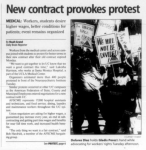If you missed it the first time, chances are you noticed the bright green shirts and horns of striking AFSCME Local 3299 members the second time, the third time or the fourth.
The recent strikes are nothing new. On May 2, 2001 the Daily Bruin published an article covering a strike staged by 400 people in support of the American Federation of State, County and Municipal Employees.
The article explains that the union workers’ contracts were up, so they asked for higher wages, guaranteed pay increases every year, more health benefits and an end to subcontracting. They were also on strike for receiving a part-time salary and benefits for working almost full-time. The union represented 17,000 workers throughout the UC system at the time.
The UC system had no comment at the time. According to the article, spokeswoman for the University of California Office of the President Abby Lunardini said she was confident things would be resolved through the negotiation process.
Employees also complained about subcontracting, which is when jobs are given to nonunion-contracted workers.
“(Subcontractors) are not doing the job that UC workers are doing,” said Bob Hardrick, who was a member of the AFSCME union at the time, in the article. “We have to redo some of the things they do because they do such a bad job.”
A worker at the Ronald Reagan UCLA Medical Center at the time, Pilar Burgess, said that subcontracting and other cost-cutting measures were hurting the patients. Burgess said unclean bedding materials and subpar cleaning chemicals used were jeopardizing patient care.
Burgees even went as far to say, “They say that the UCLA medical center is No. 1, but if you see what I see, you would say we are No. 20 or No. 40.”
Both Burgess and a protest leader and custodian at UCLA in 2001, Maxine Holloway, expressed their desires to be guaranteed better wages. Burgees said AFSCME’s request for a yearly pay raise was denied because employers thought workers were taking too many sick days. Burgess also said she wished to see better health benefits, as they had been declining over the 14 years she had worked at the university.
The Bruin said that student groups such as Conciencia Libre and the UCLA Environmental Coalition contributed to the protest as well. Students from these organizations explained that it was up to the students to make a difference and help set the tone for the protests.
A third-year environmental studies student and Environmental Coalition member at the time, Greg Hom, said its up to the students to help make a difference. Similarly, Francisco Garcia, a former Latin American studies student and member of Conciencia Libre, said that the number of people present at the protests would help set the tone for the negotiations.
While Lunardini was confident in a resolved negotiation at the time, UC employees continue to strike to this day – 18 years later. Their main complaints tackle the same issues: workers’ wages and outsourcing.
Most recently, the AFSCME held a strike April 10. Employees stated the UC condoned the intimidation of workers who participated in a previous strike. The union stated the UC violated state labor laws by “engaging in intimidation tactics, retaliating against workers, and interfering with workers’ rights, among other things.” And thus, three unfair labor practices charges were filed against the California Public Employment Relations Board.
More specifically, incidents included UC administrators providing gifts for nonstriking employees, police officer intervention and a UC Davis superintendent threatening and assaulting strikers.
[RELATED: AFSCME Local 3299 files Unfair Labor Practice charge against UC]
According to the AFSCME Local 3299 website, members of AFSCME are striking due to “UC’s new and unlawful efforts to bypass the union and spend hundreds of millions of dollars to outsource Patient Care, Service, and Skilled Craft jobs to low wages for-profit companies.”
Outsourcing, which is a broader term for subcontracting, has continued to be a problem for UC workers. The AFSCME website states that because of the outsourcing there is “deep income, racial, and gender inequality throughout the UC system.”
While many of us will groan at the idea of having to take a slightly longer, more inconvenient route in order to bypass the blaring horns, we should take a second to realize that wages, health care and people’s livelihoods are something workers have been fighting for not just today, but for decades.
